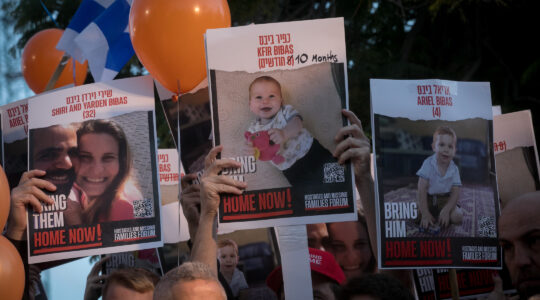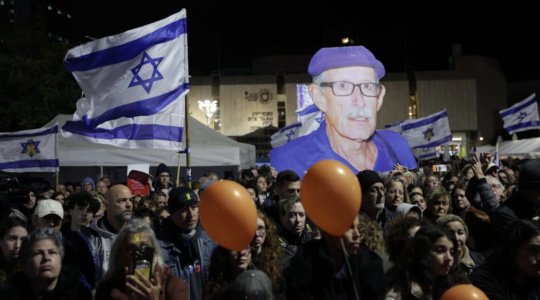NEWS ANALYSIS
JERUSALEM (JTA) — With a cease-fire in place, Israelis are asking whether the 22-day war against Hamas in Gaza achieved its aims.
The government argues that the overwhelming victory in the field will advance what was Operation Cast Lead’s primary goal: bringing a long period of quiet to civilians in southern Israel, freeing them from the tyranny of cross-border rocket attacks from Gaza.
Critics on the right, however, say the government did not go far enough. They maintain that by stopping the fighting too soon, the government let slip by a golden opportunity to topple the Hamas regime.
Right-wingers are skeptical, too, about whether Egypt and other members of the international community will be able to keep their commitments to prevent the rearmament of Hamas in Gaza.
Meanwhile, critics on the left say the fighting went on too long, that its relatively modest goals could have been achieved much earlier and that the large number of Palestinian civilian casualties, deplorable in and of itself, will hurt Israel’s international standing and breed a new generation of Palestinian fanatics unwilling to make peace on any terms.
Jerusalem hoped to achieve its goal of quiet for southern Israel by destroying as much of Hamas’ military infrastructure as possible, preventing it from being replaced and creating a new deterrent equation to make Hamas think twice before again provoking Israel.
Judged by these standards, the war seems to have been an outstanding success.
The Israel Defense Forces achieved both strategic and tactical surprise. Hamas did not expect anything like the ferocity of the Israeli onslaught; it was caught on the first day unprepared for war, and it was surprised again later when the army was able to jam remote control devices meant to detonate scores of booby-trapped buildings on advancing Israeli soldiers.
During the fighting, the military said that more than 500 militiamen were killed and the vast majority of Hamas weapons’ stores and rocket manufacturing workshops were destroyed — including dozens of medium-range Grad rockets supplied by Iran.
Israeli military intelligence says the IDF’s performance in the war, its firepower, relatively low human losses, accurate intelligence, and pinpoint coordination between air, ground and naval forces has gone a long way toward restoring Israeli deterrence — not only with regard to Hamas, but in the Middle East as a whole.
This sends a two-fold message: To the radical Iran-Syria-Hezbollah-Hamas axis, it warns not to take Israel lightly; to the moderate, pro-Western Egypt-Jordan-Saudi Arabia camp, the message is to be bolder in confronting extremist rejectionists.
The war also leaves Hamas facing a huge dilemma: whether to spend the meager resources it has on acquiring new weapons, how to smuggle them into Gaza if it decides to buy them and whether to risk another massive Israeli retaliation if it uses them.
“I don’t think they will do it again soon, and if they do they will be hit hard again,” Israeli Foreign Minister Tzipi Livni said.
The Israeli government is also confident that a string of new agreements with Egypt, the Europeans and the United States on blocking arms traffic into Gaza will prove effective.
Officials say there is a new seriousness to do so by Egypt, which has both regional and domestic reasons for wanting to keep Hamas weak. The Egyptians have no desire to see the long arm of their bitter regional foe Iran being strengthened on their doorstep, nor do they want to see further showdowns between Israel and Hamas. Such confrontations inflame Egyptian public opinion and strengthen domestic Islamic opposition led by the Egyptian branch of the Muslim Brotherhood, of which Hamas is an ideological offshoot and ally.
Until now, the Egyptians have failed to stop local Bedouin and others from conducting lucrative arms trades through the Sinai Desert and in tunnels under the Egypt-Gaza border.
As they approached Gaza, the Bedouin, who were paid enormous sums by Hamas, often would bribe Egyptian border guards to let them through. The question is whether the government in Cairo will find ways to arrest this deeply embedded practice.
The Americans and the Germans have offered Egypt state-of-the art equipment to detect smuggling tunnels and pick up would-be smugglers. The United States and some of the European countries — notably Britain, France, Germany and Italy — want to cut off the arms even before they reach Egypt.
They are offering to patrol the high seas to intercept any potential arms shipments from Iran to Egypt or directly to Gaza. In Washington last week, Livni signed a new memorandum of understanding with the United States on arms smuggling. A secret appendix talks about close intelligence cooperation on Iranian maritime movements.
The memorandum also specifically gives Israel the go-ahead to attack smuggling tunnels along the border if all other efforts to stop the flow of arms from Egypt into Gaza fail.
Six key European leaders — from Britain, France, Germany, Italy, Spain and the Czech Republic — came to Jerusalem on Sunday in a remarkable show of support for Israel. Their backing for the Jewish state was at least partly a public statement of their recognition of the fact that they and Israel are on the same side when it comes to fighting Iranian-inspired Islamic terror.
This despite the fact that, in most cases, the media and the public in their home countries have been strongly critical of the widespread destruction and heavy civilian casualty rate in Gaza caused by Israel in the war.
Egypt, which hosted the six leaders earlier in the day, has emerged as the main regional victor in the crisis. It brokered the new Hamas-Israel cease-fire, is taking on a major role against arms smuggling and is pressing Hamas and the more moderate Fatah organization, which runs the Palestinian Authority, to establish a national unity government to rebuild Gaza and talk peace with Israel.
Whether Gaza is rebuilt with Western, Arab or Iranian money, by Fatah or by Hamas, could be crucial in shaping the political orientation of its beleaguered people.
Not surprisingly, the outcome of the war is also having a major impact on the Israeli election, which is three weeks away.
During the war Defense Minister Ehud Barak, the architect of the war and leader of Israel’s Labor Party, saw his poll numbers rise at the expense of right-wing opposition leader Benjamin Netanyahu of Likud. That delivered gains to Livni, who has been running a close second behind Netanyahu.
But with the fighting now over and criticism of the war gaining traction, the pendulum is swinging back toward Netanyahu and, even more so, to Avigdor Lieberman of the right-wing Yisrael Beiteinu party.
Whichever side is able to dominate the narrative of the war’s outcome likely will determine who becomes Israel’s next prime minister.
JTA has documented Jewish history in real-time for over a century. Keep our journalism strong by joining us in supporting independent, award-winning reporting.




